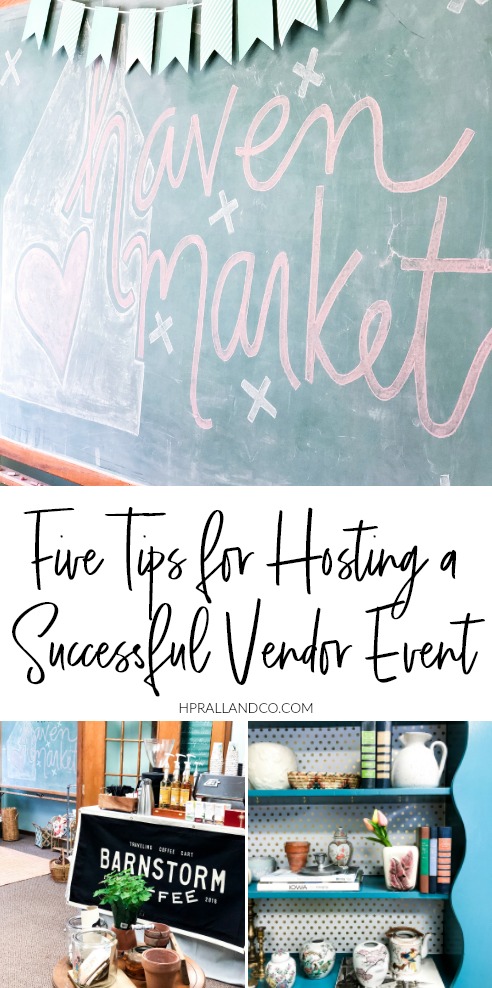How To Host A Vendor Event
To host a vendor event, first decide on the event theme and target audience, then secure a venue and invite vendors to participate.
Choosing The Right Venue
When planning to host a vendor event, choosing the right venue is crucial to its success. The venue sets the tone for the entire event and plays a key role in attracting attendees and creating a positive atmosphere. This section will cover important considerations to keep in mind when selecting the perfect venue.
Consider The Type Of Event
Before rushing into a decision, consider the type of event you are hosting. Different types of events require different types of venues. For instance, a small-scale craft fair may be better suited for a local community center or park, whereas a larger trade show may require a convention center or exhibition hall. Be sure to match the venue to the specific needs and goals of your event.
Evaluate The Location
The location of the venue is another vital aspect to consider. It should be easily accessible for both vendors and attendees. Research the area around the venue to ensure it has the necessary amenities, such as parking facilities, public transportation access, and nearby hotels or restaurants. A convenient location can significantly enhance the overall experience and encourage more people to attend.
Determine The Capacity
One of the most critical factors to assess is the capacity of the venue. You need to ensure that the venue can comfortably accommodate all your vendors and attendees. Consider the number of stalls or booths required, as well as the seating capacity if applicable. Overcrowding can diminish the experience for both vendors and attendees, so it’s important to choose a venue with ample space.
Additionally, keep in mind the layout and flow of the venue. The space should be designed in a way that allows for easy navigation and ensures each vendor has sufficient room to display their products or services. If possible, visit the venue in person to assess its suitability and envision how the event will unfold.
By carefully considering the type of event, evaluating the location, and determining the capacity of potential venues, you will be on your way to choosing the perfect venue for your vendor event. A well-selected venue sets the stage for a successful and memorable gathering that leaves both vendors and attendees eager for future events.
Planning The Event Logistics
When it comes to hosting a successful vendor event, careful planning of event logistics is crucial. From setting a date and time to securing necessary permits, every detail plays a role in creating a seamless and enjoyable experience. In this section, we will explore the essential steps for planning the event logistics.
Set A Date And Time
Choosing the right date and time is the foundation of a well-attended vendor event. Take into consideration the preferences of both vendors and attendees. Ideally, select a date that doesn’t clash with other popular events or holidays. This will maximize participation and ensure a diverse range of vendors.
Create A Budget
A well-planned budget is essential for organizing a successful vendor event. Determine how much you can allocate to various expenses such as venue rental, marketing, permits, and staff if needed. Creating a detailed budget helps you keep track of your expenses and ensures you stay within your financial limits.
Secure Necessary Permits
Before hosting a vendor event, it’s crucial to secure any necessary permits or licenses required by the local authorities. Each location may have specific regulations and requirements, so be sure to research and comply with them. Remember, obtaining the necessary permits helps ensure a smooth event and avoids any potential legal issues.
Attracting Vendors
When it comes to hosting a successful vendor event, attracting high-quality vendors is crucial. The success of your event depends on the vendors you have, as they will be showcasing their products or services to your attendees. To ensure you attract the right vendors, you need to develop a marketing strategy, reach out to potential vendors, and offer attractive incentives. Here’s how you can do it:
Develop A Marketing Strategy
Developing a marketing strategy is essential to attract vendors effectively. Firstly, identify your target vendors. Determine what types of products or services would best complement your event. Then, create persuasive content in your marketing materials to appeal to these potential vendors. Clearly communicate the benefits of participating in your event and highlight the exposure and sales opportunities they can gain.
To further optimize your marketing strategy, consider the following tactics:
- Utilize social media platforms to promote your event. Engage with potential vendors by sharing content that highlights the unique selling points of your event.
- Create a dedicated website page or landing page for your event. This page should include all the necessary information about vendor opportunities, such as booth sizes, pricing, and any additional perks.
- Send personalized emails to potential vendors, expressing your interest in their products or services and emphasizing why they would be a great fit for your event.
Reach Out To Potential Vendors
Having a proactive approach in reaching out to potential vendors is crucial. Start by creating a target list of vendors who align with the theme or niche of your event. Research their contact information and reach out to them with a personalized email or phone call. Highlight the reasons why their products or services are an excellent fit for your event and invite them to participate.
To further enhance your outreach efforts, consider the following strategies:
- Attend industry-related trade shows or events to network with potential vendors face-to-face.
- Offer early bird discounts or other incentives to encourage vendors to sign up early.
- Collaborate with local business associations or chambers of commerce to get recommendations for vendors in your area.
Offer Attractive Incentives
Incentives play a vital role in attracting vendors to your event. By offering enticing perks, you can differentiate yourself from other events and make your opportunity more appealing to vendors. Consider the following ideas:
| Incentive | Description |
|---|---|
| High-traffic booth locations | Give priority to vendors who sign up early or offer prime booth locations that receive high footfall. |
| Advertising opportunities | Include vendor spotlights in your event emails, websites, or social media promotions to give vendors additional exposure. |
| Complimentary refreshments | Offer complimentary refreshments or snacks to vendors to enhance their experience and keep them energized throughout the event. |
| Raffle or giveaways | Hold raffles or giveaways exclusively for vendors, giving them a chance to win valuable prizes. |
By implementing these strategies and offering attractive incentives, you can attract a wide range of high-quality vendors to your event. Remember to continuously evaluate and adjust your marketing efforts based on the responses you receive. With the right vendors in place, your event is poised for success.

Credit: varioproductions.com
Creating A Vendor-friendly Space
When hosting a vendor event, creating a vendor-friendly space is essential to ensure the success of the event. By arranging vendor booths strategically, providing necessary amenities, and optimizing traffic flow, you can create a welcoming environment that will attract vendors and keep attendees engaged throughout the event.
Arrange Vendor Booths
Properly arranging vendor booths is crucial in creating an organized and appealing space. Consider the layout of the venue and allocate designated areas for each vendor. This will enable vendors to showcase their products or services effectively, allowing them to interact with attendees more efficiently.
Here are a few tips to arrange vendor booths:
- Space out the booths to avoid overcrowding and ensure each vendor has enough room to showcase their offerings.
- Place popular or well-known vendors near the entrances or high-traffic areas to attract more attendees.
- Consider grouping similar vendors together to create themed sections, making it easier for attendees to find what they’re looking for.
- Provide clear signage to direct attendees to each booth, ensuring a seamless browsing experience.
Provide Necessary Amenities
In order to make vendors feel comfortable and supported, providing necessary amenities is a must. These amenities will not only enhance the vendor experience but also contribute to a positive and professional atmosphere throughout the event.
Consider offering the following amenities:
- Tables, chairs, and tablecloths for vendors to set up their booths and display their products professionally.
- Access to electricity for vendors with electronic devices that require power, such as laptops or demonstration tools.
- Ample lighting to ensure that each booth is well-lit, allowing attendees to see and appreciate the products or services being offered.
- Refreshments and a designated break area for vendors to recharge and socialize with fellow participants.
Optimize Traffic Flow
To ensure a seamless flow of traffic, optimizing the layout and arrangement of the event space is crucial. This will prevent bottlenecks and congestion, allowing attendees to easily navigate around the vendor booths and explore all offerings at their own pace.
Consider the following strategies to optimize traffic flow:
- Create wide aisles between vendor booths to accommodate a large number of attendees.
- Place popular or high-traffic vendors in separate areas to avoid congestion in one specific area.
- Strategically place informational signage or maps throughout the event space, guiding attendees to easily find their way around.
- Consider implementing a one-way traffic flow to ensure smooth movement throughout the venue.
Executing A Successful Event
When it comes to hosting a vendor event, executing the event smoothly and effectively is crucial. This is the part where you bring all the planning together and ensure that everything runs like clockwork. From coordinating event staff to ensuring a smooth vendor setup and engaging with attendees, there are several key factors to consider in order to achieve success.
Coordinate Event Staff
One of the most important aspects of executing a successful event is coordinating event staff. The staff members you choose will play a significant role in the overall experience for both vendors and attendees. Therefore, it is essential to carefully select and assign roles to your team members.
To effectively coordinate event staff, follow these steps:
- Select a team leader who will oversee all staff members and act as a central point of contact.
- Determine the specific roles and responsibilities for each staff member, such as registration, vendor assistance, and crowd management.
- Hold a pre-event meeting to brief your team on expectations, event schedule, and any relevant information they need to know.
- Ensure clear communication channels are established among staff members to address any issues or changes that may arise during the event.
- Provide staff members with any necessary resources or equipment they may need to carry out their roles effectively.
Ensure Smooth Vendor Setup
The vendor setup is a critical component of a successful vendor event. A smooth and organized setup process will contribute to a positive experience for both vendors and attendees. To ensure an efficient vendor setup, take the following steps:
- Designate a designated area for vendors to set up their booths and provide them with clear instructions on where to go upon arrival.
- Create a detailed layout plan that clearly indicates each vendor’s assigned space and any specific requirements they may have.
- Assign event staff members to assist vendors during setup, ensuring they have the necessary support and guidance.
- Perform a thorough inspection of vendor booths before the event begins to ensure they are properly set up and meet your event standards.
- Communicate with vendors about any specific rules or regulations they must adhere to during the event.
Engage With Attendees
Engaging with attendees is vital for creating a positive and memorable experience at your vendor event. By actively connecting with attendees, you can build relationships, gather feedback, and generate interest in future events. To effectively engage with attendees, consider the following strategies:
- Encourage event staff members to proactively approach attendees, answer their questions, and provide assistance.
- Organize interactive activities or demonstrations that encourage attendees to participate and interact with vendors.
- Use social media platforms to promote the event and encourage attendees to share their experience using event-specific hashtags.
- Consider offering incentives or discounts to attendees who visit and engage with multiple vendors.
- Collect feedback from attendees through surveys or comment cards to gain valuable insights and improve future events.

Credit: adamchristing.com

Credit: hopelesslyheather.com
Frequently Asked Questions Of How To Host A Vendor Event
How Do I Find Vendors For A Vendor Event?
To find vendors for your event, consider reaching out to local businesses, searching online directories, and networking at industry events.
What Should I Include In Vendor Event Contracts?
When creating vendor event contracts, include details like dates, payment terms, booth sizes, and cancellation policies to ensure a clear understanding between both parties.
How Can I Promote My Vendor Event Effectively?
To promote your vendor event, use social media platforms, create a dedicated website or landing page, leverage email marketing, and collaborate with local influencers or bloggers.
Conclusion
Planning and hosting a successful vendor event requires thorough organization, effective marketing strategies, and engaging activities. By implementing these tips and guidelines, you can ensure a seamless event that not only attracts vendors but also keeps attendees entertained. Remember to conduct thorough research, establish clear goals, and communicate effectively to create a memorable experience for all parties involved.
With careful planning and execution, your vendor event will stand out among the rest and leave a lasting impression.


